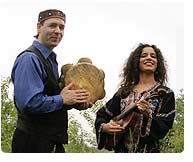|
|
 |
 View Additional Info
View Additional Info
From the Homeland to the Heartland:
Headspinning Middle Eastern Music at Salaam’s Annual Gala in March
Imagine Kentucky schoolchildren impulsively clapping along to an Iraqi folk song. Picture a breakdancer from the audience spontaneously doing headspins at a Middle Eastern concert in Iowa. These are regular occurrences for Salaam—one of the only professional Middle Eastern music ensembles based in Indiana. The group—which will be presenting Salaam’s sixth annual Middle Eastern Gala on March 6 at the Buskirk-Chumley Theater in Bloomington, Indiana—fills a need for music from the Middle East in the Mid-West.
Salaam’s repertoire is even more diverse than its membership, which includes an Iraqi-American, a Syrian-American, a Turk, a Palestinian-American, European-Americans, and a Jew from New Jersey. The group’s experience and existence challenge the common perception of the homogeneity of Middle America. Endorsements from local cultural pockets have played a large part in the band’s musical direction, picking up melodies here, learning rhythms there.
“Our first Lebanese wedding tipped us over the edge,” recalls bass-player Ron Kadish. “We were nervous about having an all-Arab audience, so we worked hard to get ready for that performance.” Nowadays the group is called upon regularly to perform at Arab weddings throughout the Midwest
“A local Iraqi doctor hired us for his wedding,” says viola-player Dena El Saffar. “The groom’s father—an ambassador to Cyprus—didn’t speak much English. He was ill with cancer; walking with a cane. But when we unknowingly played his favorite song, he got up and danced, swinging his cane over his head. Afterwards, we talked and talked about music and he kept his word and sent me a package of Iraqi tapes all the way from Cyprus.”
When Salaam was hired as a Klezmer band, they boned up in their Ashkenazi songs. When they were hired for Greek celebrations, they broadened their Mediterranean scope. The group is evidence of a long historical pattern of the continued diversification of America, even in “the Heartland.”
While there are other music groups in America that play Arab and Middle Eastern music, Salaam stands out for a few reasons. Many of the other groups are unknown outside of their respective communities, only heard by audiences at “ethnic celebrations” and weddings. The few groups that are not solely based in a cultural community often take a more academic approach to their repertoire. The diversity of Salaam’s membership, their commitment to performances that groove, and their musical flexibility allow them to cross genres and translate performances to a variety of audiences and settings. Educating their audiences is a priority for the group, so they do not take shortcuts using electric keyboards to replace acoustic instruments and live percussion. Their March Gala will be preceded by an educational family matinee. They feel that they have a mission beyond mere entertainment, and it is easy to see why.
Two men step off planes in Israel/Palestine. One is handed citizenship, though he has never been there before. The other’s citizenship and official papers are revoked, though it is his homeland and place of birth. Both of the men are musicians in Salaam.
When visiting Palestine/Israel two years ago, Israeli officers took away the Palestinian identification of Jerusalem-born, American Raja Hanania—who plays an hourglass-shaped ceramic drum, or tableh, in Salaam. Hanania had come to America to go to college and was heartbroken by this slap in the face on one of his annual visits to his Palestinian home. Meanwhile, bass player Ron Kadish came to Israel to play with the Jerusalem Symphony Orchestra, and as an American Jew was granted citizenship instantly.
“As a Jew playing in Salaam,” says Kadish, “my overt political contribution is to say, ‘Hey, it’s OK, we don’t all have to be fighting each other.’”
That’s what an Arab food vendor said to him after a Festival performance in Milwaukee: “You’re not an Arab, are you?” she asked. Upon getting the answer she replied, “Isn’t it great that in this country we can all get along?”
Additional Info
 From the Homeland to the Heartland:Headspinning Middle Eastern ...
From the Homeland to the Heartland:Headspinning Middle Eastern ...
 The Origins of Middle East/Mid-West Ensemble Salaam
The Origins of Middle East/Mid-West Ensemble Salaam
 Collaborations, Past Performances, and Quotes
Collaborations, Past Performances, and Quotes
Top of Press Release
|
|
 |
|
|
|